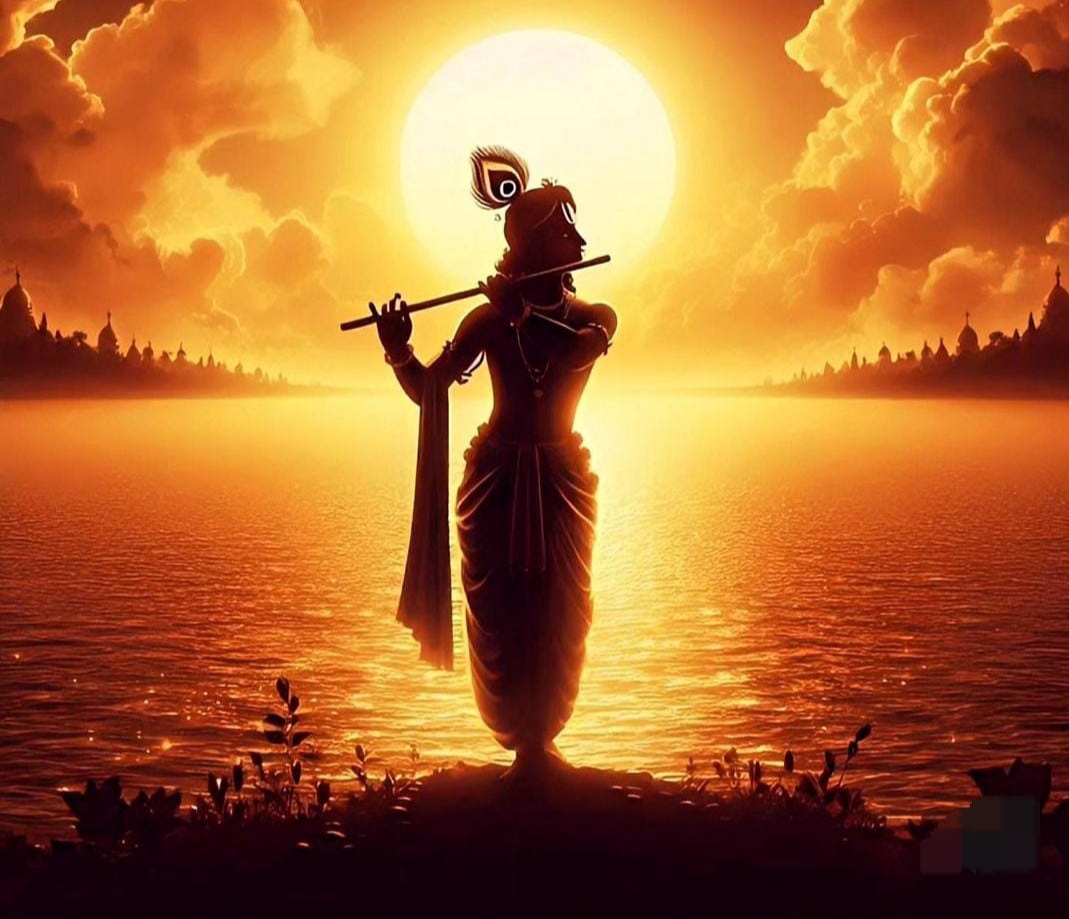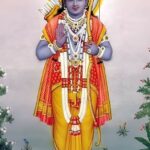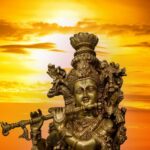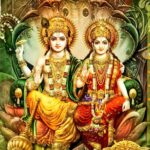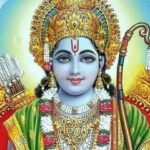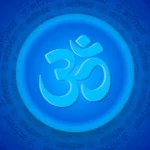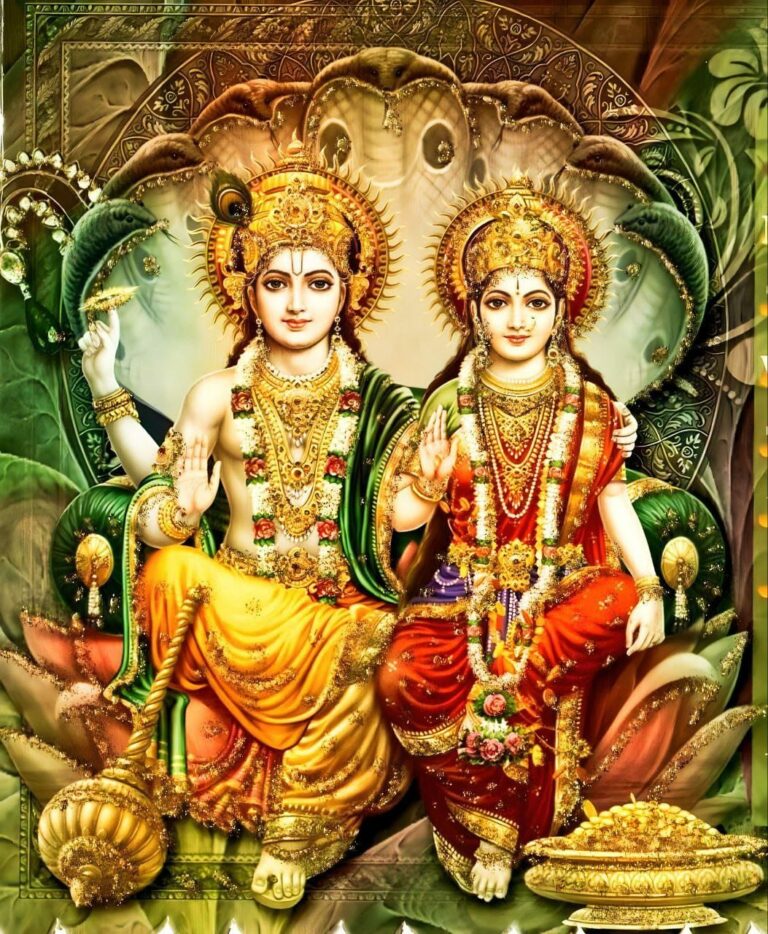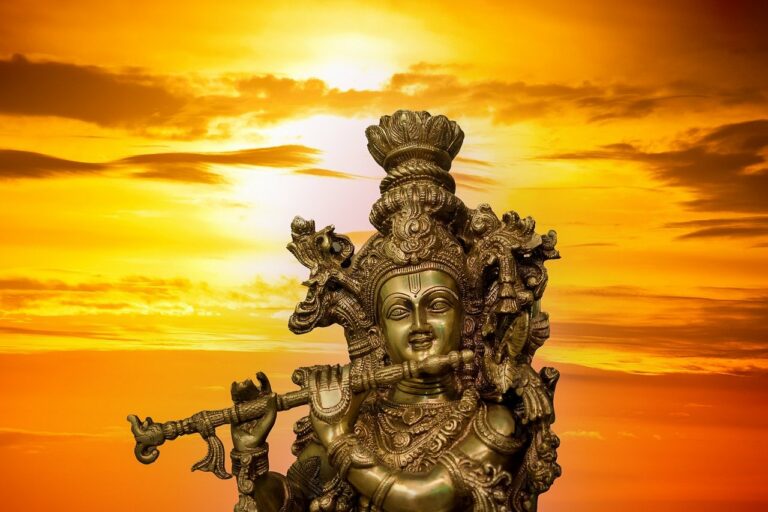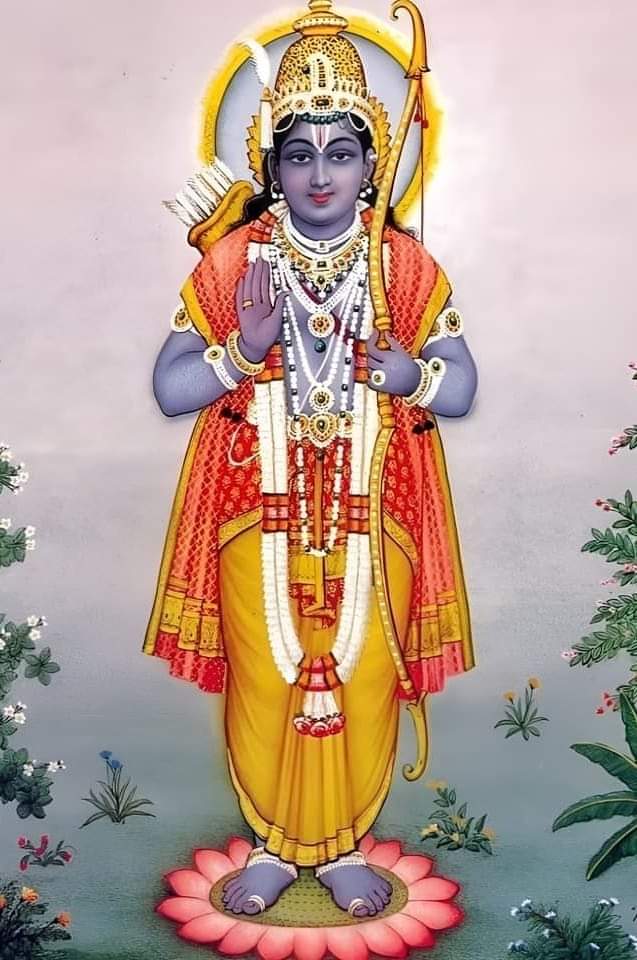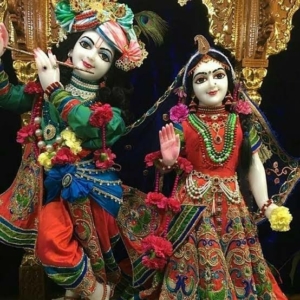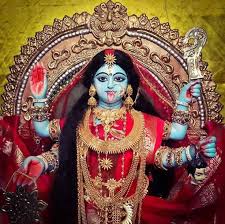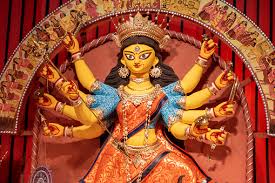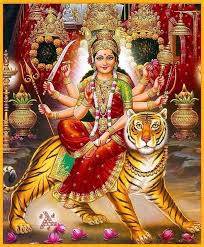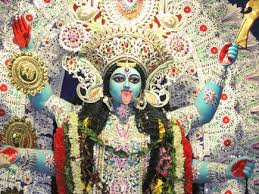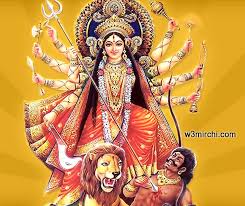मूकं करोति वाचालं पंगु लंघयते गिरिम्।
यत्कृपा तमहं वन्दे परमानन्दमाधवम्।।
यन्नखेन्दुरुचिर्ब्रह्म ध्येयं ब्रह्मादिभिः सुरैः।
गुणत्रयमतीतं तं वन्दे वृन्दावनेश्वरम्।।
अविस्मृति कृष्णपदारविन्दयोःक्षिणोत्यभद्राणि शमं तनोति च।
सत्त्वस्य शुद्धिं परमात्मभक्तिंज्ञानं च विज्ञानविरागयुत्कम्।।
‘भगवान श्रीकृष्ण के चरणारविन्दों की स्मृति सदा बनी रहती है तो उसके प्रभाव से समस्त पापों तथा अशुभों का नाश कल्याण की प्राप्ति, अन्तःकरण की शुद्धी, परमात्मा की भक्ति और वैराग्ययुक्त ज्ञान-विज्ञान की प्राप्ति अपने-आप हो जाती है।’
आज उन्हीं भगवान श्रीकृष्ण के प्राकट्य-महोत्सव का मंगलमय दिवस है; इस महान मंगल अवसर आप, हम सब भगवान श्रीकृष्ण का पवित्र स्मरण करके जीवन को पवित्र और मंगलमय बनायें।
अवतार तथा अवतार के कारण और स्वरूप-
अवतार का अर्थ है- अवतरण, परब्रह्म का उतरना। भगवान सर्वातीत हैं, सर्वमय हैं, सर्वव्यापक हैं, सदा-सर्वत्र विराजित हैं; पर उन्होंने अपनी ‘सर्वभवन-सामर्थ्य’ से- माया से- योगमाया से अपने को ढँक रखा है। अपनी इच्छा से ही लीला के लिये कभी-कभी वे इस आवरण को किसी अंश में हटा कर लोक के सामने प्रकट हो जाते हैं, यही उनका अवतरण है। इसी का नाम अवतार है।
यह अवतार स्वयं अक्षर ब्रह्म, भगवान विष्णु का भी होता है और किसी शुद्ध सत्त्व को आधार बनाकर भी होता है। भगवान के इस अवतार को श्री शंकराचार्य-सरीखे अद्वैवतवादी महापुरुषों ने भी मुक्तकण्ठ से स्वीकार किया है।
जो लोग यह कहते हैं कि ‘कोई मनुष्य अपनी उन्नति करते-करते जब महान् गुणों से सम्पन्न होकर उच्च स्तर पर पहुँच जाता है, तब उसी को भगवान का अवतार कहते हैं, उनका यह कहना ठीक नहीं है। यह तो ‘आरोहण’ है- चढ़ना है, अवतरण उतरना नहीं। भगवान तो अवतरित होते हैं। ये अवतार अनेक प्रकार के होते हैं-
लीलावतार,
पुरुषावतार,
अंशावतार,
कलावतार,
गणावतार,
युगावतार,
आवेशावतार,
विभवावतार और
अर्चावतार आदि।
सभी अवतारों में लीला के लिये अवतरण होता है, अतः सभी को अवतार कहा जाता है और इन अवतारों में कोई छोटा-बड़ा नहीं है। जब सबका भगवान से प्रादुर्भाव है, तब सभी पूर्ण हैं। शास्त्र कहते हैं-
सर्वे नित्याः शाश्वताश्च देहास्तस्य परात्मनः।
हानोपादानरहिता नैव प्रकृतिजाः क्कचित्।।
परमानन्दसंदोहा ज्ञानमात्रश्च सर्वतः।
सर्वे सर्वैर्गुणैः पुर्णाः सर्वदोषविवर्जिताः।।
ये सभी नित्य हैं। शाश्वत हैं, इनके हानोपादानरहित अप्राकृत देह हैं, प्रकृति से उत्पन्न नहीं हैं। ये जन्म-मृत्यु आदि सर्वदोषों से रहित, सर्वगुण सम्पन्न, पूर्ण और ज्ञानस्वरूप, परमानन्दसंदोह है। इनमें देश, काल या शक्ति के कारण किसी प्रकार का तारतम्य नहीं है। शक्ति के प्रकाश की नयूनाधिकता से ही इनमें तारतम्य माना जाता है।
एक बलवान् पुरुष में पाँच मन बोझ उठाने की शक्ति है, पर जहाँ एक छटाँक वजन ही उठाना है, वहाँ एक छटाँक वजन उठाने पर यह नहीं कहा जा सकता कि उसमें पाँच मन उठाने की शक्ति नहीं हैं। शक्ति तो पूरी है, पर वहाँ शक्ति के प्रकाश का प्रयोजन नहीं है।
इसी प्रकार पूर्ण शक्तिमान भगवान के अवतार में प्रयोजनानुसार किसी में कम शक्ति प्रदर्शन है; किसी में अधिक का। इस शक्ति के प्राकट्य और अप्राकट्य के तारतम्य को लेकर ही पूर्णत्व और अंशत्व का कथन है। इसी से कहा गया है-
प्रकाशिताखिलगुणः स्मृतःपूर्णतमो बुधैः।
असर्वव्यंजकः पूर्णतरः पूर्णोऽल्पदर्शकः।।
“भगवान जब अपने अशेष गुणों को प्रकट करते हैं, तब वे ‘पूर्णतम’ कहे जाते हैं; जब सब गुणों को प्रकट न करके बहुत- से गुणों को प्रकट करते हैं, तब ‘पूर्णतर’ और जब उनसे भी कम गुणों को प्रकट करते हैं तब ‘पूर्ण’ कहलाते हैं!”
श्रीलघु भागवतामृत में कहा है-
अंशत्वं नाम शक्तीनां सदाल्पांशप्रकाशिता।
पूर्णत्वं च स्वेच्छयैव नाना शक्तिप्रकाशिता।।
“अनन्त शक्तिशाली भगवान जब अल्पशकितयों को प्रकट करते हैं, तब वह अवतार ‘अंश’ कहलाता है और जिसमें अपनी इच्छा से बहुत-सी शक्तियों को प्रकट करते हैं, वह ‘पूर्ण’ कहा जाता है।”
शक्ति क्या है? इस विषय में कहा है-
शक्तिरैश्वर्यमाधुर्यकृपातेजोमखा गुणाः।
शक्तेर्व्यक्तिस्थाव्यक्तिस्तारतम्यस्य कारणम्।।
‘ऐश्वर्य, माधुर्य, कृपा और तेज आदि गुण ही शक्ति कहलाते हैं। इन शक्तियों का प्राकट्य और अप्राकट्य ही तारतम्य का कारण है।’ नहीं तो भगवान के सभी अवतार पूर्ण हैं।
जहाँ जैसा लीला क्षेत्र होता है, वहाँ उसी के अनुसार शक्ति का प्रकाश होता है- शक्ति समान होने पर भी वहाँ प्राकट्य के भेद से फल में भी भेद दिखायी देता है जैसे-
शक्तिः समापि पुर्यादिदाहे दीपाग्नि पुंजयोः।
शीताद्यार्तिं च येनाग्निपुजदेवसुखं भवेत्।।
‘नगर को जलाने के लिये एक दीपक में जो शक्ति है, अग्निपुंज में भी वही शक्ति है; (इस दृष्टी से) दोनों समान हैं। पर अग्निपुंज की एक विशेषता है- शीतादि कष्ट को दूर करता हो तो वह दीपक की ज्योति से नहीं होता; शीतानाश का सुख तो अग्नि पुंज से ही मिल सकता है।’ इसी प्रकार अवतारों की अंश-कलादिरूप में अभिव्यक्ति होती है।
परब्रह्म भगवान के ही रूपान्तर भूमापुरुष अन्तर्यामी भगवान शुद्ध सत्त्व को आधार बनाकर असुरसंहार, साधुसंरक्षण तथा धर्मस्थापनादि-रूप लीला के लिये अपने इच्छानुसार देश आदि के आवरण को हटाकर ज्ञान या क्रियारूप अंश से लोक में प्रकट होते हैं; तब उन्हें ‘अंशावतार’ कहा जाता है। पर कभी-कभी अनन्त कल्याणगुणगणपरिपूर्ण ‘स्वयं भगवान’ परात्पर ब्रह्म पूर्ण पुरुषोत्तम किसी सत्त्वादि को आधार न बनाकर अपने नित्य अप्राकृत दिव्य सच्चिदानन्दस्वरूप से- जो दिव्य शरीर-इन्द्रिय-अन्तः करणादिरूप से अप्रकट हैं- असुरोद्धार, साधुपरित्राण, धर्म-स्थापनादि प्रयोजन को लेकर प्रधानतया साधननिरपेक्ष अपने सम्बन्ध या दर्शनमात्र से ही सबका उद्धार करने के लिये अपने माधुर्य और ऐश्वर्य युक्त स्वरूप से अंशाश सहित अपने को इच्छित लोक में प्रकट करते हैं, तब उसे ‘पूर्णावतार’ कहते हैं। यह अवतार कहलाने पर भी वस्तुतः ‘स्व्यं भगवान का पूर्ण आविर्भाव’ होता है। ऐसा पूर्ण अविर्भाव बहुत कम हुआ करता है।
यही परात्पर ब्रह्म का पूर्णाविर्भाव पूर्णतम पुरुषोत्तम भगवान श्रीकृष्णचन्द्र हैं। श्री कृष्णावतार अनेक कल्पों में होता है, परंतु स्वयं भगवान का पूर्णाविर्भाव सारस्वत कल्प में ही होता है। इस परिपूर्णाविर्भाव में समस्त अंश कलाओं का भी समावेश रहता है- स्वाभाविक ही करोड़ रुपयों में सौ, दौ-सौ, हजार, दो हजार का रहता है। इसी से श्रीकृष्ण को नारायण ऋषि के अवतार, अंशावतार, भगवान श्रीनारायण के कृष्णकेशावतार, क्षीरोदशायी, सहस्रशीर्षा, वैकुण्ठाधिपति महानारायण, श्वेतद्वीपपति विष्णु भी कहते हैं और इसी से इस साधन निरपेक्ष उद्धार करने वाले अविर्भाव में भी असुरोद्धार, साधुपरित्राण और धर्मसंस्थापन आदि अंशकलावतारों के कार्य भी सुसम्पन्न होते देखे जाते हैं।
परंतु वास्तव में श्रीकृष्ण साक्षात परात्पर पूर्ण ब्रह्म, पूर्ण पुरुषोत्तम, सर्वव्यापक, सर्वकर्ता, सर्वमय, सर्वातीत, अप्रमेय, दिव्यानन्दस्वरूप, प्राकृतिक गुणरहित, स्वरूपभूत दिव्य कल्याणगुणगणवारिधि, आनन्दकार, सर्वशक्तिविशष्ट, अशकलापूर्ण ‘स्वयं भगवान’ हैं।
अन्य अवतार ‘अंश-कला’ हैं-
एते चांशकलाः पुंसः कृष्णास्तु भगवान स्वयम्।
‘भगवान’ शब्द का अर्थ अष्टांगयोगी लोग इन्हीं भगवान को ‘परमात्मा’, उपनिषद-निष्ठ वेदान्ती ‘ब्रह्म’ और ज्ञानयोगी ‘ज्ञान’ कहते हैं-
भगवान परमात्मेति प्रोच्यतेऽष्टांयोगिभिः। ब्रह्मेत्युपनिषन्निष्ठैर्ज्ञानं च ज्ञानयोगिभिः।।
श्रीमद्भागवत में कहा है-
वदन्ति तत् तत्त्वविदस्तत्त्वं यज्ज्ञानमद्वयम्।
ब्रह्मेति परमात्मेति भगवानिति शब्द्यते।।
श्रीकृष्ण ही ये ‘स्वयं भगवान’ हैं श्रीकृष्ण ही परमात्मा हैं और श्रीकृष्ण ही ब्रह्म हैं। ‘भगवत’ शब्द की निरुक्ति है-
ऐश्वर्यस्य समग्रस्य वीर्यस्य यशसः श्रियः।
ज्ञानवैराग्ययोश्चैव षण्णां भग इतींगना।।
ज्ञानशक्तिबलैश्वर्यवीर्यतेजांस्यशेषतः।
भगवच्छब्दवाच्यानि विना हेयैर्गुणादिभिः।।
‘अनन्त ऐश्वर्य, अनन्त वीर्य, अनन्त यश, अनन्त श्री, अनन्त ज्ञान और अनन्त वैराग्य- ये छः भग जिसमें स्वरूपभूत रूप से नित्य वर्तमान हैं, वे भगवान हैं। ‘ज्ञान, शक्ति, बल, ऐश्वर्य, वीर्य, तेज- इनका नाम भग है। ये सब अनन्त रूप से जिसमें वर्तमान हैं, वे भगवान हैं।’ ये सभी गुण भगवान श्रीकृष्ण में नित्य-निरन्तर स्वरूपतः वर्तमान हैं।
‘न्यायविवरण’ में भगवान वासुदेव की पूर्णता के सम्बन्ध में कहा गया है-
पूर्णनन्दः पूर्णभुक् पूर्णकर्ता पूर्णज्ञानः पूर्णभाः पूर्णशक्ति।
पूर्णैश्वर्याद् भगवान वासुदेवो विरुद्धशक्तिर्न च दोषस्पृगीशः।
षडैश्वर्यपूर्ण भगवान में पूर्ण आनन्द, पूर्ण भोक्तृत्व, पूर्ण कर्तृत्व, पूर्ण ज्ञान, पूर्ण ज्योति, पूर्ण शक्ति, पूर्ण ऐश्वर्य, विरुद्धशक्तित्व और अदोषस्पर्शित्व विद्यमान हैं।
भगवान में विरुद्ध धर्मों का आश्रयत्व-
भगवान विरुद्धधर्माश्रय हैं; जो विरुद्धधर्माश्रय नहीं होता, वह पूर्ण नहीं होता। इसी से श्रुतियों ने ब्रह्म में विरुद्ध धर्मों का समाश्रय बतलाया है-
‘अणोरणीयान् महतो महीयान्।’
‘वह सूक्ष्म से भी सूक्ष्म और महान से भी महान है।’
‘आसीनो दूरं व्रजति शयानो याति सर्वतः।’
‘बैठा हुआ ही दूर चला जाता है, सोता हुआ ही सब ओर चला जाता है।’
‘तदेति तन्नैजति तद् दूरे तद्वन्तिके।’
‘वह चलता है और नहीं भी चलता; वह दूर है और पास भी है।’
तुरीयमतुरीयमात्मानमनात्मानमुग्रमनुग्रं वीरमवीरं महान्तममहान्तं विष्णुमविष्णं ज्वलन्तमज्वलन्तं सर्वतोमुखमसर्वतोमुखम्।
‘जो तुरीय भी है, अतुरीय भी आत्मा भी है और अनात्मा भी, उग्र भी है और अनुग्र (शान्त) भी, वीर भी है और अवीर भी है, महान भी है, अमहान (अल्प) भी है, विष्णु (व्यापक) भी है, अविष्णु (एकदेशीय) भी है, प्रकाशमान भी है, अप्रकाशमान भी है, सर्वतोमुख (सब ओर मुखवाला) भी है, असर्वतोमुख (एक ओर मुखवाला ) भी है।’
पुराणों में कहा गया है-
अस्थूलोऽणुरूपोऽसावविश्वो विश्व एव च।
विरुद्धधर्म रूपोऽसावैश्वर्यात् पुरुषोत्तमः।।
यों नित्य युगपत विरुद्ध-धर्माश्रयता परब्रह्म का लक्षण है। भगवान श्रीकृष्ण ने स्वयं अपने श्री मुख से-
अजोऽपि सन्नव्ययात्मा भूतानामीश्वरोऽपि सन्।
प्रकृतिं स्वामधिष्ठाय सम्भवाम्यात्ममायया।।
अजन्मा, अविनाशिस्वरूप और समस्त प्राणियों के ईश्वर होते हुए ही जन्म ग्रहण करने की बात कहकर अपने विरुद्धधर्माश्रय होने का वर्णन किया है।
मुझ अव्यक्तमूर्ति से यह सारा जगत परिपूर्ण है। ये समस्त भूत मुझ में हैं, मैं इनमें नहीं हूँ। ये भूत मुझमें नहीं हैं, मेरे योगैश्वर्य को तुम देखो। गीतोक्त यह कथन भी ‘विरुद्धधर्माश्रयत्व’ का वर्णन है।
भगवान श्रीकृष्ण महान भोगी होकर भी परम योगी, विभक्त हो कर भी सदा अविभक्त, सर्वकर्ता हो कर भी सदा अकर्ता, दृश्र्य होकर भी अदृश्य, परिच्छिन्न होकर भी विभु, जन्म लेने वाले होकर भी अजन्मा, सापेक्ष होकर भी सदा निरपेक्ष, ( प्रेमी के सामने ) महामुग्ध होकर भी परम चतुर, ( प्रेम के राज्य में ) सकाम होकर भी नित्य पूर्णकाम, ( प्रेम राज्य में ) दीन होकर भी नित्य अदीन, भक्त-प्रेमवश पराधीन होकर भी परम स्वतन्त्र, बन्धनयुक्त होकर भी नित्यमुक्त, प्रेमय होकर भी अप्रमेय, भक्तिगम्य हो कर भी परम अगम्य, ममतायुक्त होकर भी नित्य निर्मम, अनेक होकर भी सदा एक, अत्यन्त बुभुक्षित होकर भी नित्यतृप्त और सर्वसम्बन्धयुक्त होने पर भी सर्वसम्बन्धविरहित हैं। ये बातें उनके लीला चरित में सुस्पष्ट हैं।
श्रीकृष्ण सच्चिदानन्दघनविग्रह स्वयं भगवान-
यहाँ यह बात भी जान लेनी चाहिये कि भगवान श्रीकृष्ण का शरीर और उनका आत्मा पृथक्-पृथक् नहीं हैं। वे सर्वतोरूपेण सच्चिदानन्दरसमय हैं; उनके मन, बुद्धि, इन्द्रिय, अंग, अवयव- सभी अप्राकृत, भगवत्स्वरूप हैं। उनका वह स्वरूपभूत भगवद्देह नित्य-अवितर्क्य-ऐश्वर्यसम्पन्न चिन्मय और परिच्दिन्न होकर भी विभु है। वे कर्मवश पांचभौतिक देह नहीं धारण करते, स्वेच्छा से अपने नित्य सच्चिदानन्दवपु को प्रकट करते हैं-
स्वेच्छामयस्य न तु भूतमयस्य कोऽपि।
पद्यपुराण, पातालखण्ड में भगवान श्रीकृष्ण ने अपने ही दूसरे लीला स्वरूप भगवान श्रीरुद्र को दर्शन देकर अपने निराकार, निर्गुण, व्यापक निष्क्रिय ब्रह्मरूप की व्यख्या करते हुए कहा है-
“रुद्र! तुम इस समय मेरे जिस अलौकिक अप्राकृतिक दिव्य रूप को देख रहे हो, वह निर्मल प्रेम का पुंज है, सच्चिदानन्दमय है। मेरा यह रूप पांचभौतिक आकार वाला नहीं है। तथा दिव्य चक्षुओं से ही यथार्थ देखा जाता है; इसलिये वेद इसे ‘निराकार’ कहते हैं। प्राकृतिक सत्त्व-रज-तम मेरे गुण नहीं हैं, वे अप्राकृत- स्वरूप हैं तथा उन दिव्य गुणों का अन्त नहीं है; इससे मुझे ‘निर्गुण’ कहा गया है। मैं अपने चैतन्य अव्यक्त रूप से सर्वत्र व्यापक हूँ, इससे मुझको ‘व्यापक’ ब्रह्म कहा जाता है। मैं इस प्रपंच का कर्ता नहीं हूँ मेरे अंश ही मायामय गुणों के द्वारा सृष्टि आदि कार्य करते हैं; इसलिये शास्त्र मुझको ‘निष्क्रिय’ कहते हैं।”
अतएव श्रीकृष्ण का श्रीविग्रह नित्य सच्चिदानन्दघन श्रीकृष्णस्वरूप ही है। महाभारत में श्रीकृष्ण परब्रह्म होना स्थान-स्थान पर सिद्ध है- उनकी लीला से भी और उनके सम्बन्ध में कहे हुए महापुरुषों के वचनों से भी। सच्ची बात तो यह है कि महाभारत के महानायक ही हैं- सच्चिदानन्दघन अखिलप्रेमामृतसिन्धु सर्वात्मा परात्पर ब्रह्म भगवान श्रीकृष्ण।
समस्त महाभारत आद्यन्त तथा मध्य में भी भगवान श्रीकृष्ण के गुण-माहात्म्य से ही परिपूर्ण है। भगवान व्यासदेव, मार्कण्डेयमुनि, नारद, अंगिरा, भृगु, सनत्कुमार, असित, देवल, परशुराम, भगवान ब्रह्मा, पितामह भीष्म आदि के द्वारा भगवान श्रीकृष्ण की महिमा का महाभारत में स्थान-स्थान पर विशद वर्णन है। स्वयं भगवान श्रीकृष्ण ने अपना महत्त्व बतलाया है। यहाँ भीष्मपितामह के दो-चार वाक्य उदधृत किये जाते हैं-
तस्माद् ब्रवीमि ते राजन्नेष वै शाश्वतोऽव्ययः।
सर्वलोकमयो नित्यः शास्ता धात्राधरो ध्रुवः।।
यो धारयति लोकांस्त्रींश्चराचरगुरुः प्रभुः।
योद्धा जयश्च जेता च सर्वप्रकृतिरीश्वरः।।
राजन् सर्वमयो ह्येष तमोरागविवर्जितः।
यतः कृष्णस्ततो धर्मो यतो धर्मस्ततो जयः।।
वासुदेवो महद् भूतं सर्वदैवतदैवतम्।
न परं पुण्डरीकाक्षाद् दृश्यते भरतर्षभ।।
सर्वभूतानि भूतात्मा महात्मा पुरुषोत्तमः।
केशवः परमं तेजः सर्वलोकपितामहः।।
एनमाहुर्हृषीकेशं मुनयो वै नराधिप।
ये च कृष्णं प्रपद्यन्ते ते न मुह्यन्ति मानवाः।।
भये महति मग्नांश्च पाति नित्यं जनार्दनः।
राजन्! भगवान श्रीकृष्ण सर्वलोकमय, सनातन, अविनाशी, नित्य, शासक, धरणीधर और अचल हैं। इन चराचर-गुरु भगवान श्रीहरि ने तीनों लोकों को धारण कर रखा है। ये ही विजयी हैं, ये ही विजय हैं, ये ही योद्धा हैं। और सबके परम कारण परमेश्वर भी ये ही हैं। राजन! श्री हरि सर्वस्वरूप तथा तम और रज से विवर्जित हैं। ये श्रीकृष्ण जहाँ हैं, वहीं धर्म है और जहाँ धर्म है, वहीं विजय है।
भरत श्रेष्ठ ! वसुदेव नन्दन श्रीकृष्ण वास्तव में महान हैं, ये समस्त देवताओं के परम आराध्य हैं। कमलनयन श्रीकृष्ण से बढ़कर या इनके अतिरिक्त दूसरा कोई दिखायी नहीं देता। ये भगवान ही सर्वभूतमय हैं, ये ही सबके आत्मा हैं, ये ही महात्मा हैं और पुरुषोत्तम हैं। नरनाथ! ये भगवान केशव सम्पूर्ण लोकों के पितामह हैं। ये परम तेज हैं। मुनिजन इनको हृषीकेष कहते हैं। जो मानव भगवान श्रीकृष्ण की शरण लेते हैं, वे कभी मोह में नहीं पड़ते। भगवान जनार्दन महान भय में निमग्न उन मनुष्यों की सदा रक्षा करते हैं।
महाभारत का गहराई से अध्ययन-मनन करने वाले पुरुष यह भली-भाँति जानते हैं कि महाभारत के मुख्य प्रतिपाद्य भगवान श्रीकृष्ण ही हैं। महाभारत के आदि पर्व में ही कहा गया है-
भगवान् वासुदेवश्च कीर्त्यतऽत्र सनातनः।
स कि सत्यमृतं चैव पवित्रं पुण्यमेव च ।।
शाश्वतं ब्रह्म परमं ध्रवं ज्योतिः सनातनः।
यस्य दिव्यानि कर्माणि कथयन्ति मनीषिणः।।
असच्च सदसच्चैव यस्माद् विश्वं प्रवर्तते।
यत्तद् यतिवरा मुक्ता ध्यानयोगबलान्विताः।।
प्रतिबिम्बमिवादर्शे पश्यन्त्यात्मन्यवस्थितम्।
इस महाभारत में सनातन भगवान वासुदेव की महिमा ही गायी गयी है। वे ही सत्य हैं। वे ही ऋतु हैं, वे ही पावन और पवित्र हैं। वे ही शाश्वत परब्रह्म हैं नित्य विचल ज्योतिःस्वरूप सनातन पुरुष हैं। मनीषीविद्वान उन्हीं की दिव्य लीलाओं का वर्णन करते हैं। असत और सत तथा यह सत् और असत रूप सारा विश्व उन्हीं से उत्पन्न हुआ है। ध्यानयोग के बल से समन्वित जीवन्मुक्त संन्यासीगण दर्पण में प्रतिबिम्ब की भाँति अपने अन्तःकरण में इन्हीं परमात्मा का साक्षात्कार करते हैं।
आचार्य श्रीमदानन्दतीर्थ भगवत्पाद ने ‘श्रीमहाभारततात्पर्यनिर्णय’ नामक ग्रन्थ में इस बात को उदाहरण देकर भलीभाँति सिद्ध कर दिया है। ।। कृष्णस्तु भगवान स्वयं ।।
He makes the dumb speak and the lame cross the mountain I salute Him whose grace is the source of supreme bliss.
That which is the taste of the moon, the Brahman, is to be meditated upon by Brahma and other demigods. I salute that lord of Vrindavan who transcends the three modes of nature
Unforgettableness at the lotus feet of Krishna dispels evils and brings peace. Purification of Sattva, devotion to the Supreme Self and knowledge combined with knowledge and detachment.
‘If the memory of the feet of Lord Shri Krishna always remains, then due to its influence, all sins and inauspicious things are destroyed, attainment of well-being, purification of conscience, devotion to God and knowledge and science with dispassion automatically happen.’
Today is the auspicious day of the festival of appearance of Lord Shri Krishna; On this great auspicious occasion, you and all of us make our lives sacred and auspicious by remembering Lord Krishna.
Reasons and forms of incarnation and incarnation-
Avtaar means incarnation, descent of Parabrahm. God is beyond all, omnipresent, omnipresent, always present everywhere; But he has covered himself with his ‘all-power’ – from Maya – Yogamaya. Due to his own wish, sometimes for the sake of fun, he removes this cover to some extent and appears in front of the people, this is his incarnation. Its name is Avatar.
This incarnation is of Akshar Brahm himself, Lord Vishnu and also takes place on the basis of some pure entity. This incarnation of God has also been accepted openly by monistic great men like Shri Shankaracharya.
Those who say that ‘When a person, while progressing, attains a high level by becoming endowed with great qualities, then he is called an incarnation of God, it is not correct to say this. This is ‘Aarohan’ – climbing, not descending. God incarnates. There are many types of these incarnations-
Leelaavatar, male incarnation, Anshvatar, Kalavatar, Ganavatar, Yugavatar, Passionate, potential and Archavatar etc.
In all incarnations there is incarnation for Leela, hence all are called incarnations and no one is big or small among these incarnations. When everyone has emanation from God, then everyone is complete. The scriptures say-
All the bodies of that Supreme Soul are eternal and everlasting. They are never born of nature without the means of loss.
The doubt of supreme bliss and knowledge alone everywhere. All of them are full of all virtues and free from all faults.
These are all routine. They are eternal, their bodies are non-natural and are not born from nature. He is free from all the defects of birth and death, full of all qualities, complete and an embodiment of knowledge, blissful doubt. There is no coordination of any kind in these due to time, place or power. It is only because of the small amount of power of light that they are considered to be in harmony.
A strong man has the power to lift five maunds of load, but where only one sixth of the weight has to be lifted, if he lifts one sixth of the weight, it cannot be said that he does not have the power to lift five maunds. The power is complete, but there is no use of the light of power there.
Similarly, in the incarnation of the all-powerful God, there is lesser display of power in some as per the purpose; More in some. The statement of completeness and partiality is based on the correspondence of the manifest and non-manifest of this power. From this it is said-
The revealed all-quality is remembered by the wise as the most perfect. He is not all-expressive, he is more complete, he is complete, he is less visible.
“When God manifests His infinite qualities, He is called ‘the most complete’; When one does not reveal all the qualities but reveals many qualities, then one is called ‘complete’ and when one reveals fewer qualities then one is called ‘complete’!”
It is said in Srilaghu Bhagavatamrita-
Partiality is the ever-expressed fraction of the energies. and perfection is voluntarily manifested by various powers.
“When the infinite powerful God manifests minor powers, then that incarnation is called ‘Ansh’ and the one in which He manifests many powers as per His will, is called ‘Complete’.”
What is power? It is said in this regard-
Power, wealth, sweetness, grace, splendor and sacrifice are the virtues. The manifestation of the power in the manifestation is the cause of the transcendence.
‘The qualities like opulence, sweetness, grace and brightness etc. are called Shakti. The manifestation and non-manifestation of these powers is the reason for harmony.’ Otherwise, all the incarnations of God are complete.
Wherever there is a field of play, there is light of power accordingly – even if the power is the same, there is a difference in the result due to the difference in appearance, like –
The power is equal to the burning of the city and the beams of the lamp and fire. and cold and other sufferings by which the worshiper of fire and the gods may be happy.
‘The power that a lamp has to burn a city, a beam of fire also has the same power; (From this point of view) both are equal. But Agnipunj has one specialty – if it removes the sufferings like cold etc. then it is not done by the light of the lamp; The happiness of destruction can be obtained only from the fire.’ Similarly, the incarnations are expressed in part-art form.
Bhumpurush Antaryami God, a form of Supreme God, based on pure Sattva, appears in the world in the form of knowledge or action, removing the cover of country etc. as per His wish for the purposes of killing demons, protection of saints and establishment of religion etc. Then he is called ‘Anshavtaar’. But sometimes, the Supreme Brahma Purushottam, who is full of infinite welfare qualities, without taking any Sattwadi as the basis, in His daily uncreated divine Sachchidanand Swarup – who is unmanifested from the divine body, senses and soul – acts primarily for the purpose of upliftment from demons, protection of saints, establishment of religion, etc. Irrespective of means, He manifests Himself in the desired world with His sweetness and majesty form in order to save everyone just by His relationship or philosophy, then He is called ‘Purnavatar’. Despite being called an incarnation, it is actually ‘the complete manifestation of God himself’. Such complete disappearance happens very rarely.
This is the complete manifestation of the Supreme Brahma, the most perfect man, Lord Krishnachandra. Shri Krishna incarnates in many Kalpa, but the complete manifestation of God himself takes place only in Saraswat Kalpa. In this completeness, all the fractions are also included – naturally there are hundred, two-hundred, thousand, two thousand in crores of rupees. Due to this, Shri Krishna is also called the incarnation of Narayan Rishi, Ansavatar, Lord Shri Narayan’s Krishnakeshawatar, Kshirodshaayi, Sahasrashirsha, Vaikunthadhipati Mahanarayan, Shwetdvipati Vishnu and due to this, even in this manifestation of salvation independent of means, the works of Anshakalavatars like asurodharjan, sadhuparitraan and establishment of religion etc. Are seen to be well off.
But in reality, Krishna is the Supreme Personality of Godhead, the Supreme Personality of Godhead, the Supreme Personality of Godhead, the omnipresent, omnipresent, omnipresent, omnitranscendental, immeasurable, divine bliss, devoid of natural qualities,
Other incarnations are ‘ansh-kala’-
These are the parts of the man, and the Lord Himself is Krishna.
The word ‘Bhagavan’ means that the Ashtanga Yogis call this same God ‘Paramatma’, the Upanishadic Vedantaists ‘Brahma’ and the Jnana Yogis ‘Knowledge’-
The Lord is called the Supreme Self by the eight Yogis. and knowledge by the Yogis of knowledge who are devoted to the Upanishads as Brahman.
It is said in Srimad Bhagwat-
The knowers of the Tattva say that is the Tattva which is knowledge, which is one and the same. He is called Brahma, the Supreme Soul, the Supreme Personality of Godhead.
Shri Krishna is the ‘Lord Himself’, Shri Krishna is the Supreme Soul and Shri Krishna is the Brahma. The meaning of the word ‘Bhagwat’ is-
of wealth, of all strength, of fame, of prosperity. Bhaga is the sixth in knowledge and renunciation.
Knowledge, power, strength, wealth, might and splendor are the rest. They are expressed by the words of the Lord without the insignificant qualities and others.
‘Infinite opulence, infinite semen, infinite fame, infinite Shri, infinite knowledge and infinite dispassion – these six parts in which are always present in physical form, are God. ‘Knowledge, power, strength, opulence, semen, brilliance – their name is Bhaga. The one in whom all these are eternally present is God.’ All these qualities are present in Lord Shri Krishna in a daily and continuous form.
In ‘Nyayavivaran’ it has been said regarding the perfection of Lord Vasudev –
He is full of joy, full of eating, full of doing, full of knowledge, full of light, full of power. Because of His full opulence, Lord Vasudeva is the opposite power and is not the Lord who touches faults.
Complete joy, complete enjoyment, complete action, complete knowledge, complete light, complete power, complete majesty, viruda power and flawless touchability are present in the Shadaishvarya Purna God.
Shelter of opposing religions in God- God is against religion; That which is not based on opposite principles is not complete. Due to this, the scriptures have explained the subordination of opposite religions in Brahma –
‘Anoraniyan mahato mahiyan.
‘He is subtler than the subtle and greater than the great.’
‘Sitting goes far away, lying down goes everywhere.
‘The one sitting goes far, the one sleeping goes everywhere.’
‘That is what it does not shine, that is far away, that is near.
‘He walks and may not walk; He is far away and also near.
The fourth, the fourth, the Self, the Selfless, the fierce, the fierce, the heroic, the heroic, the great, the great, the Vishnu, the Vishnu, the burning, the burning, the all-faced, the all-faced.
‘The one who is Turiya, Aturiya, soul and non-soul, fierce and peaceful, brave and non-veteran, great, amhaan (small) and Vishnu (widespread) too. ‘He is Avishnu (one-dimensional), he is luminous, he is non-luminous, he is Sarvatomukh (faced on all sides), and he is Asarvatomukh (faced on one side).’
It is said in the Puranas-
The gross is in the form of atoms, the non-universe and the universe. The form of the opposite of righteousness is the Supreme Personality of Godhead because of its wealth.
Thus, daily simultaneous dependence on opposite religions is a symptom of Parabrahma. Lord Shri Krishna himself said from his Shri mouth-
Though unborn, yet inexhaustible, though the Lord of beings. By my own illusory energy I am able to take possession of my own nature.
By talking about being unborn, imperishable and taking birth despite being the God of all living beings, he has described being dependent on his own religion.
This whole world is filled with me as the unmanifested form. All these ghosts are in me, I am not in them. These ghosts are not in me, you see my Yogaishwarya. This statement from the song is also a description of ‘Virudha Dharmasrayatva’.
Lord Shri Krishna, despite being a great enjoyer, is the ultimate yogi, despite being divided, is always undivided, despite being the doer, is always the non-doer, despite being visible, being invisible, being separated, being the Vibhu, being born, being yet unborn, being relative, being always absolute, (in front of the lover) ) Extremely clever even after being fascinated, (in the kingdom of love) always full of work despite being successful, (in the kingdom of love) always submissive despite being humble, supremely independent despite being under the influence of devotee-love, eternally free despite being bound, indefatigable despite being loved, worthy of devotion. Despite being extremely unapproachable, despite being full of love, he is always ruthless, despite being many, he is always one, despite being extremely hungry, he is always satisfied and despite being connected to everyone, he is devoid of all connections. These things are clearly visible in his character.
Sri Krishna Sachchidanandaghanavigraha Himself Lord- It should also be noted that the body and soul of Lord Krishna are not separate. They are all-pervasive and full of true bliss; His mind, intellect, senses, limbs, organs- all are unnatural, God-like. His that embodied body of the Lord is eternally inconceivable, endowed with opulence, and is omnipotent even though it is conscious. They do not assume the five-material body by karma, but voluntarily manifest their eternal Sachchidananda Vapu-
None of the self-willed, but of the past.
In Padyapuran, Paatalkhand, Lord Shri Krishna, while giving darshan of his own second leela form, Lord Shri Rudra, while explaining his formless, nirgun, all-pervasive passive Brahma form, has said –
“Rudra! The supernatural unnatural divine form that you are seeing at this moment is a bundle of pure love, full of truth and joy. This form of mine is not of five physical shapes. And reality is seen only through divine eyes; That is why Vedas call it ‘formless’. Natural Sattva-Raja-Tama are not my qualities, they are non-natural forms and there is no end to those divine qualities; Due to this I have been called ‘Nirguna’. I am omnipresent in my unmanifested form of consciousness, hence I am called ‘widespread’ Brahma. I am not the creator of this world, only my parts do the work of creation etc. through illusory qualities; That is why the scriptures call me ‘passive’.”
Therefore, the Srivigraha of Sri Krishna is the eternal Sachchidanandaghan Sri Krishna form. In the Mahabharata, Krishna being Parabrahma is proved in places – both by His pastimes and by the words of the great personalities spoken about Him. The truth is that the great hero of the Mahabharata is the Sachchidanandaghan Akhilpremamritasindhu Sarvatma Paratpara Brahma Lord Krishna.
The entire Mahabharata, both in the beginning and in the middle, is full of the qualities and greatness of Lord Krishna. There is a detailed description of the glory of Lord Shri Krishna at various places in the Mahabharata through Lord Vyasdev, Markandeyamuni, Narada, Angira, Bhrigu, Sanatkumar, Asit, Deval, Parashuram, Lord Brahma, Pitamah Bhishma etc. Lord Shri Krishna himself has explained its importance. Here two-four sentences of Bhishmapitamah are quoted-
Therefore I tell you, O king, that this is eternal and inexhaustible. He is the eternal ruler of all the worlds and the sure supporter of the creator.
He who sustains the three worlds, the master of moving and non-moving beings. He is the warrior, the victory and the conqueror, the Lord of all nature.
O king this is all-pervading and devoid of darkness and passion. Where Krishna is, there is Dharma; where Dharma is, there is Victory.
Vasudeva is the great being, the God of all the gods. Nothing is seen beyond the eyes of the lotus, O best of the Bharatas.
All beings are the Self of beings, the great Self, the Supreme Person. Kesava is the supreme effulgence and the grandfather of all the worlds.
O lord of men the sages call him Hrishikesha And those men who take refuge in Krishna are not deluded. Janardana always protects those who are immersed in great fear.
Rajan! Lord Shri Krishna is universal, eternal, indestructible, eternal, ruler, sustainer and immovable. Lord Shri Hari, the Charachar-Guru, has held all the three worlds. These are the victorious, these are the victory, these are the warriors. And God is also the ultimate cause of everything. Rajan! Shri Hari is in all forms and is free from Tama and Raja. Wherever this Shri Krishna is, there is religion and where there is religion, there is victory.
Bharat Shrestha! Vasudev Nandan Shri Krishna is truly great, he is the most worshipable of all the gods. No one else is visible greater than or apart from the lotus-eyed Shri Krishna. This God is omnipresent, he is the soul of everyone, he is the Mahatma and the best man. Narnath! This Lord Keshav is the grandfather of all the worlds. These are extremely bright. Sages call him Hrishikesh. Those humans who take refuge in Lord Krishna never fall into temptation. Lord Janardan always protects those people who are immersed in great fear.
People who deeply study and meditate on the Mahabharata know very well that the main exponent of the Mahabharata is Lord Shri Krishna. It is said in the Adi Parva of Mahabharata itself –
The eternal Lord Vasudeva is also mentioned here. That which is true and immortal and holy and pious
The eternal Brahman, the Supreme, the Constant, the Eternal Light. The sages describe his divine deeds
The untruth is the good and the truth from which the universe proceeds. That is what the best of the ascetics are liberated from, endowed with the power of meditation and yoga. They see it as a reflection in a mirror, dwelling in themselves.
In this Mahabharata only the glory of the eternal Lord Vasudev has been sung. They are the truth. Those are the seasons, they are the holy and sacred. He is the eternal Parabrahma, the eternal man in the form of ever-changing light. The mystics describe his divine pastimes only. False and true and this true and false form, the whole world has arisen from them. Jivanmukta sannyasis, who are integrated with the power of meditation, experience this same God in their hearts like a reflection in a mirror.
Acharya Srimadanandatirtha Bhagavatpada has well proved this by giving examples in his book ‘Srimahabharatatatparyanirnaya’ ।। Krishna is the Lord Himself.

